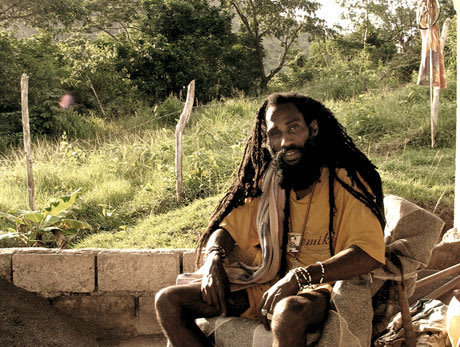Early on in Rise Up we're told that no smaller, poorer, more insignificant country in the world has had a greater impact on music around the world. Jamaica, with all its homegrown problems of poverty and violence, manages to be a factory for enchanting, powerful and inspiring musicians. In virtually every pocket of the small island there is a talented musician trying to bust out and "rise up" to stardom.
This is basis of Rise Up, which follows three Jamaican musicians aspiring to break out of obscurity, poverty or both and achieve success. There's Turbulence, a dreadlocked Rastafarian poet who can spout off lyrical rhymes at will to the camera. He's already respected as one of the brightest reggae stars in the ghetto but needs that one hit to launch him globally. There's Anastasia Ice, a privileged white rapper from uptown Jamaica who uses his father's influence to turn his hobby into a career. Lastly, there's Kemoy, a young, humble farm girl with a graceful voice that flies out of the squalor like an angel; it's a voice that eventually finds legendary reggae producers Sly and Robbie.
Whether it's the polished studio work we see Turbulence craft or a street musician playing a one-string guitar, the music jumps of the screen with the vibrancy we expect from a documentary like this. Unfortunately, unlike, say, the desperate and near-pathetic fight for success of Anvil: The Story of Anvil, in terms of storytelling, the stakes never seem high enough in Rise Up. This is due in part to the carefree, laidback attitude of Jamaican culture. We never see anyone get too stressed out about his or her career or express themselves with the unbridled passion of desperate, starving artists.
The poverty is clear in the film and we know the quality of life is well below the standards of the tourists who come to Montego Bay, but for someone like Kemoy, her career is not the arbiter of her happiness. Same with the ambitious Anastasia Ice; he skulks around the entire film with a false prima donna attitude but after his final performance, when things don't go quite as planned, he takes it all in stride, and it's certainly nothing a good fat spliff can't fix.
This is perhaps a testament to the unique outlook on life of the Jamaican people, which unintentionally makes for the most fascinating angle of the film.
This is basis of Rise Up, which follows three Jamaican musicians aspiring to break out of obscurity, poverty or both and achieve success. There's Turbulence, a dreadlocked Rastafarian poet who can spout off lyrical rhymes at will to the camera. He's already respected as one of the brightest reggae stars in the ghetto but needs that one hit to launch him globally. There's Anastasia Ice, a privileged white rapper from uptown Jamaica who uses his father's influence to turn his hobby into a career. Lastly, there's Kemoy, a young, humble farm girl with a graceful voice that flies out of the squalor like an angel; it's a voice that eventually finds legendary reggae producers Sly and Robbie.
Whether it's the polished studio work we see Turbulence craft or a street musician playing a one-string guitar, the music jumps of the screen with the vibrancy we expect from a documentary like this. Unfortunately, unlike, say, the desperate and near-pathetic fight for success of Anvil: The Story of Anvil, in terms of storytelling, the stakes never seem high enough in Rise Up. This is due in part to the carefree, laidback attitude of Jamaican culture. We never see anyone get too stressed out about his or her career or express themselves with the unbridled passion of desperate, starving artists.
The poverty is clear in the film and we know the quality of life is well below the standards of the tourists who come to Montego Bay, but for someone like Kemoy, her career is not the arbiter of her happiness. Same with the ambitious Anastasia Ice; he skulks around the entire film with a false prima donna attitude but after his final performance, when things don't go quite as planned, he takes it all in stride, and it's certainly nothing a good fat spliff can't fix.
This is perhaps a testament to the unique outlook on life of the Jamaican people, which unintentionally makes for the most fascinating angle of the film.




